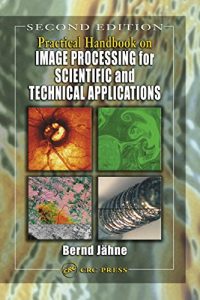Image processing is fast becoming a valuable tool for analyzing multidimensional data in all areas of natural science. Since the publication of the best-selling first edition of this handbook, the field of image processing has matured in many of its aspects from ad hoc, empirical approaches to a sound science based on established mathematical and physical principles.
The Practical Handbook on Image Processing for Scientific and Technical Applications, Second Edition builds a sound basic knowledge of image processing, provides a critically evaluated collection of the best algorithms, and demonstrates those algorithms with real-world applications from many fields. It covers all aspects of image processing, from image formation to image analysis, and gives an up-to-date review of advanced concepts. Organized according to the hierarchy of tasks, each chapter includes a summary, an outline of the background the task requires, and a section of practical tips that help you avoid common errors and save valuable research time.
New in the Second Edition:
Expanded application areas now include technical fields such as the automotive industry, quality inspection, and materials science
More practical tips in each chapter
Discussion of digital camera interfaces and a comparison of CMOS vs. CCD cameras
A section on wavelets
Advanced techniques for reconstruction, new segmentation methods based on global optimization and anisotropic diffusion, and additional classification techniques, including neural networks, polynomial classification, and support vector machines
Just as digital image processing provides the key to studying complex scientific problems that researchers once could only dream of tackling, this handbook unlocks the intricacies of image processing and brings its power and potential within the grasp of researchers across the spectrum of scientific and engineering disciplines.
The Practical Handbook on Image Processing for Scientific and Technical Applications, Second Edition builds a sound basic knowledge of image processing, provides a critically evaluated collection of the best algorithms, and demonstrates those algorithms with real-world applications from many fields. It covers all aspects of image processing, from image formation to image analysis, and gives an up-to-date review of advanced concepts. Organized according to the hierarchy of tasks, each chapter includes a summary, an outline of the background the task requires, and a section of practical tips that help you avoid common errors and save valuable research time.
New in the Second Edition:
Just as digital image processing provides the key to studying complex scientific problems that researchers once could only dream of tackling, this handbook unlocks the intricacies of image processing and brings its power and potential within the grasp of researchers across the spectrum of scientific and engineering disciplines.






